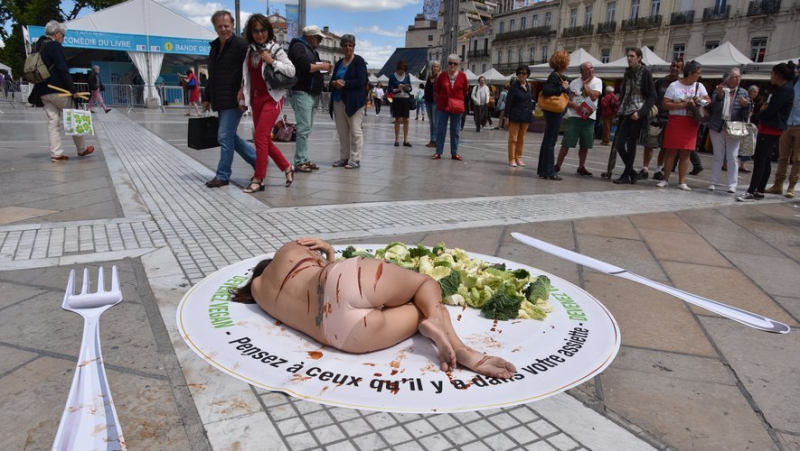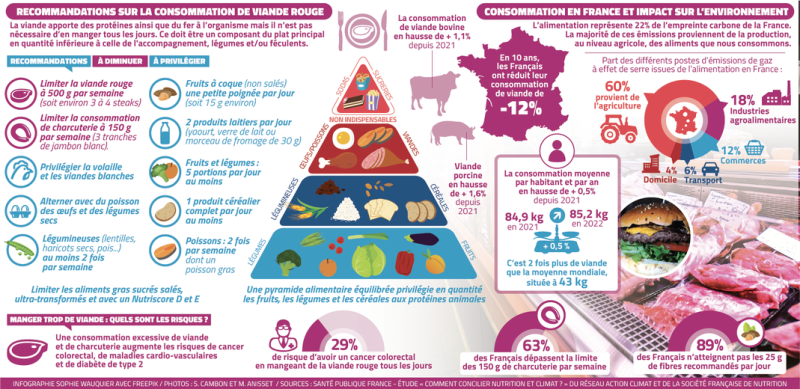Should you halve your meat consumption ? “We eat too much, less is already good”: advice from Dr Goncalves

À Montpellier, des végans interpellent sur la consommation de viande, place de la Comédie. Midi Libre – JEAN MICHEL MART
On February 20, the "Climate Action" and the "French Nutrition Society" have launched a call to reduce meat consumption by 50%, and not to exceed 450 g maximum per week, to protect both our health and the environment. With 85.2 kg per year on average, the French are among the most “carnivorous" of the planet. Pascal Goncalves, general practitioner and speaker, explains why you need to reduce your animal protein intake.
Pascal Goncalves is the author of the book "Prevention is better" (19.90 €), published in March 2023 by Editions Thierry Souccar, based in Vergèze, in the Gard.

For Dr. Goncalves, "there is meat and meat”.
Eating less meat is good for your health and for the planet ?
Indeed, we believe that for health and the planet, we should reduce our meat consumption.
The benefit of meat for health is that it represents a good source of very good quality protein, iron easily assimilated by the body and vitamin B12.
Whatever meat ?
There is meat, and meat. We must distinguish between unprocessed meat and processed meat. Within unprocessed meat, you will have red meat such as beef, pork, and poultry: chicken, turkey… Notice right away that I am not talking about red meat and white meat. It is more interesting to distinguish in unprocessed meat between red meat and poultry.
Then there is so-called processed meat: this is charcuterie. And finally there is ultra-processed meat.
What is it ?
Industrial nuggets or industrial sausages for example, which will be presented as meat but which in fact contain almost no meat and which do not have the virtues that I mentioned ( proteins, iron., B12…).
When we talk about health benefits, we're talking about "real" meat, namely unprocessed meat.
Nuggets, industrial sausages and others are generally foods that contain many additives or ultra-processed ingredients. The concern lies in the fact that excessive and regular consumption of ultra-processed foods would be associated with an increased risk of being overweight, diabetes and certain cancers for example.
"The Mediterranean diet suggests moderate consumption of poultry and limited consumption of red meat"
And this is not the case for unprocessed meat ?
No, I'm getting there. But to put an end to processed meat, we also know that high consumption of cold meats is a risk factor for colon cancer, certain cardiovascular diseases and type 2 diabetes for example.
Concerning unprocessed meat: if we take the example of red meat, we know that high consumption of red meat is a risk factor for colon cancer and probably also other cancers. We do not find this risk with poultry.
The idea that it's better to eat “white” meat, even if you don't use that word, than “red” meat. is therefore true…
Yes. Knowing that everything that is not poultry, generally speaking, is red meat. And pork is not a white meat. But be careful, we are absolutely not saying that we must eradicate red meat.
The general message is "Eat less meat, but of better quality", that is to say while being concerned about the conditions of& #39;breeding, outdoors.

A portion of 450 grams maximum per week seems like the right amount ?
I advocate a diet without prohibitions, without weighing food or counting calories, but first based on the quality of what we eat, then on the quantity.
I assume that today, we all eat too much meat. Less is already good.
Then, when you are interested in health, and in the planet too, if you ask a doctor the question "What is the best dietary model ?", he will answer you "the Mediterranean diet" which offers moderate consumption of poultry and very limited red meat, and especially more plant products.
"You do as usual and before eating, you cut your portion in half"
And if we want to be more concrete…
I frequently use my hand to help people see portions. A palm of your hand represents approximately 100 g. I recommend not exceeding four palms of a hand per week of meat, including a maximum of two palms of a hand of red meat. For charcuterie, you should not consume more than once a week but you can very well do without it because it does not add much, even artisanal charcuterie, and it is high in salt, not to mention the nitrite problem. Industrial nuggets and industrial sausages should be limited as much as possible. Going without poultry and meat for a long time can, however, pose problems.
The problem today is that in a meal, you need meat, and something to accompany it. It's hard to have a meal without animal products, whether fish or meat.
And we are far from that today…
I first ask people to limit cold cuts and ultra-processed meats, and once our meat consumption is "real" meat, we can be interested in the quantity we eat. I say "You do as usual, and before eating, you cut your portion in half".
"The combination of legumes + cereals has two advantages: for health and for the planet"
Is fish equivalent to meat, and among the alternatives, are legumes the most obvious solution??
The first alternative you mention is fish. Yes, it's an excellent alternative, but there are less and less of it, and it is more and more contaminated by pollutants. I recommend eating it twice a week and alternating between lean and fatty fish.
Eggs are the same, they're an excellent alternative to meat but you have to be wary of the breeding conditions.
Finally, the best alternative is legumes, which we recommend combining with whole grains to find the balance of animal proteins, which comprise all of the range of essential amino acids. In legumes, it lacks an essential amino acid. In cereals, too. When you combine the two, you're sort of making the equivalent of animal protein. It's excellent for your health, and for the planet.
To be clear, the legume + cereal combination is, on the one hand, lentils, chickpeas, split peas, and other wheat, barley…
Yes, exactly, cereals are rice, wheat with pasta and semolina, corn…
It has to be whole grains.
And to be complete on the issue, I call for vigilance on plant-based alternatives. Because there is everything. Some are based on ultra-processed ingredients that we cannot recommend, they are bad for your health and for the planet.
It's the vegetable steak ?
Among others. The problem is that it's difficult to make a vegetable steak look like a real steak if you don't use of ultra-processed ingredients. But there are also good industrial alternatives made from simple ingredients. Remember to read the list of ingredients.
We have to relearn how to eat real plant products! Until people understand what they are eating, they cannot make good choices. But we have to stop thinking that it's complicated to make the right choices. It's very simple when it's explained to us. But it takes a little more time because you have to cook. And you need variety. No single food is good or bad for your health, what matters is the overall quality of your diet.
I subscribe to read more




